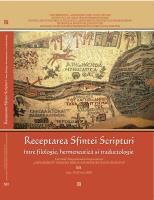Despre un sens uitat al scripturii
On a forgotten meaning of Scripture
Author(s): Florin CrîșmăreanuSubject(s): Philosophy of Religion, Biblical studies, Systematic Theology
Published by: Editura Universităţii »Alexandru Ioan Cuza« din Iaşi
Keywords: Biblical Hermeneutics; the four senses of Scripture; Maximus the Confessor; sensus Incarnationis;
Summary/Abstract: In this paper, structured in two sections, I intend to examine a meaning of Scripture that I consider to be forgotten. The context that led to this situation was most likely due to the fact that we are dealing with an unclassifiable meaning, which initially was not captured by the classical doctrine of the four interpretations (literal, allegorical, moral, anagogical) and moreover later, following Schleiermacher’s general hermeneutics (1768-1834) that continues to dominate the exegetical framework today, could hardly have been supported, even if one had so wished. In the early centuries of Christianity, the Alexandrian exegetes suggested that there was a deeper meaning to Scripture which they did not wish to divulge (for example, we find the idea in Origen of Alexandria, Didymus the Blind, Evagrius Ponticus et al). I believe that this meaning can be discovered, to a certain extent, if one considers an exemplary statement found in the Expositio orationes dominicae of Maximus the Confessor (580-662): “In fact, the Word of God made flesh teaches theology in that in Himself he reveals the Father and the Holy Spirit”. This insight will help us to point out that biblical interpretation should never be an exclusively human activity, but a synergistic, divine-human work.
Journal: Receptarea Sfintei Scripturi: între filologie, hermeneutică şi traductologie
- Issue Year: 12/2023
- Issue No: 1
- Page Range: 149-160
- Page Count: 12
- Language: Romanian

